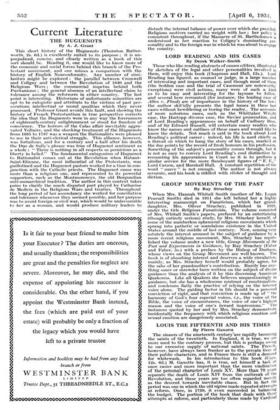GROUP MOVEMENTS OF THE PAST By Ray Strachey When Mrs.
Hannah Whitall Smith (mother of Mr. Logan Pearsall Smith) died in 1911 she left behind her a highly, interesting manuscript on Fanaticism, which her grand- daughter, Mrs. Oliver Strachey, published in 1929, under the title Religious Fanaticism. The volume consisted of Mrs. Whitall Smith's papers, prefaced by an entertaining (though entirely serious) study, by Mrs. Strachey herself, of some of the numberless ephemeral religious movements which sprang into pathetic or scandalous existence in the United States around the middle of last century. Now, sensing very astutely the interest aroused in the subject of guidance by a more recent religious movement, Mrs. Strachey has repub- lished the volume under a new title, Group Movements of the Past and Experiments in Guidance, by Ray Strachey (Faber and Faber; 5s.) with a preface by the Bishop of Durham, whose views on the Group Movement are well known. The book is of absorbing interest and deserves a wide circulation, mainly, as Mrs. Strachey herself would probably agree, for the sake of her grandmother's contribution. Rarely has any- thing saner or shrewder been written on the subject of divine guidance than the analysis of it by this discerning American Quakeress. Like all Quakers she believes unquestioningly in guidance, but she has a wholesome mistrust of emotionalism, and condemns flatly the practice of relying on the interior voice alone. The guiding factor in life should be a personal conviction of right, and that conviction is made 'up of " the harmony of God's four especial voices, i.e., the voice of the Bible, the voice of circumstances, the voice of one's highest reason and the voice of one's inward impressions." The instances quoted by her and by Mrs. Strachey demonstrate incidentally the frequency with which religious emotion and sexual emotion are dangerously associated.








































 Previous page
Previous page